Remember when sales meant knocking on doors and dialing numbers? Picture a realm where AI carries out those monotonous undertakings, giving you extra time to strategize. Welcome to the future of sales.
Here’s how AI is changing sales: Imagine not having to sift through tons of data for potential leads. Personalized emails are sent automatically yet sound like they were written by humans. Predictive analytics forecasting accurate revenue outcomes to help your sales teams reach their targets faster.
These scenarios are no longer a pipe dream. Advanced AI technology is already revolutionizing the sales process for companies like Microsoft and Salesforce. With the introduction of generative AI technology, companies are making sales teams work smarter rather than harder.
But it’s more than just about tech upgrades or fancy algorithms. This transformation goes deeper, touching every aspect of our operations.
Discover how AI is changing sales — enhancing sales interactions and boosting revenues through intelligent AI sales tools.
Table Of Contents:
- How AI is Changing Sales
- Streamlining Sales Processes with AI
- Better Customer Engagement
- Implementing AI Tools for Sales Excellence
- Real-World Applications of AI in Sales
- Balancing AI and Human Interaction in Sales
- Which Sales Jobs Are at Risk of Being Replaced by AI?
- The Future of Sales
- FAQs – How AI is Changing Sales
- Conclusion
How AI is Changing Sales
Artificial intelligence (AI) is making waves across various industries, and sales is no exception.
AI is shaking up sales in some pretty cool ways.
First off, it’s like having a super-smart assistant on steroids. You know how your phone predicts what you’re about to type? Imagine that, but for predicting what your customers might want to buy.
AI helps businesses analyze massive amounts of data lightning-fast. This means companies can spot trends, understand customer behaviors, and even predict when someone might be ready to make a purchase. It’s like having a crystal ball, but way more accurate.
Chatbots are another game-changer. They’re not just those little pop-ups on websites anymore. AI-powered chatbots can have legit conversations with customers. They can answer questions, recommend products, and even help with the whole buying process. It’s like having a 24/7 sales rep who never takes a coffee break.
And let’s not forget about personalization. AI can customize the sales experience for each customer. It’s not just a “Dear Customer” email anymore. AI can analyze a person’s preferences, browsing history, and interactions to tailor recommendations and messages. It’s like having a sales pitch that’s written specifically for a particular customer.
But here’s the real kicker: AI isn’t here to replace salespeople. Sales automation is here to make your life easier. It handles the repetitive tasks, so humans can focus on building relationships and making those real, human connections. So, it’s not just changing sales but upgrading the entire experience.
Incorporating high-tech solutions into a sales team’s operations doesn’t mean losing the human touch. The ability of humans to understand complex emotions remains critical when building business relationships. Emotional intelligence can add depth when understanding customers’ needs or concerns – something even sophisticated machines struggle with.
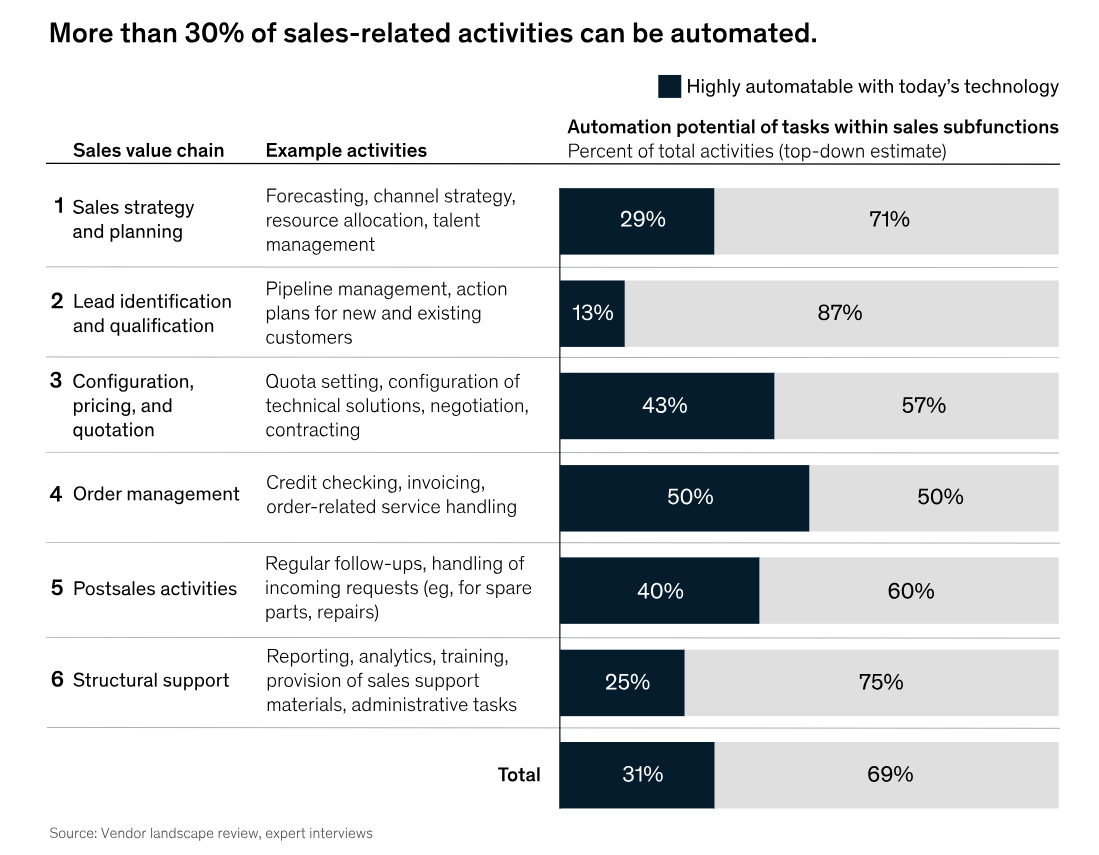
Source: McKinsey & Company
Streamlining Sales Processes with AI
A critical aspect where AI comes into play is automating routine tasks within the sales process. Repetitive jobs like email follow-ups or updating customer records can be tedious and time-consuming for human salespeople.
AI sales tools, however, can handle these chores effortlessly, freeing up valuable time for your team to focus on more strategic tasks that require a personal touch.
Data-Driven Decisions & Predictive Analytics
In addition to task automation, another significant advantage offered by AI technology lies in its ability to support data-driven decisions. These insights go beyond gut feelings or past experiences; they are rooted in concrete evidence derived from meticulous data analysis performed at scale.
Predictive analytics uses historical patterns and trends combined with real-time customer behavior data to make accurate predictions about future outcomes — helping companies improve forecasting accuracy dramatically while minimizing risk exposure.
This approach not only enhances decision-making but also ensures you stay ahead of market trends and respond proactively instead of reactively when situations change rapidly.
Leveraging Machine Learning For Personalization
Machine learning — a subset of artificial intelligence — is making waves across industries due to its potential power to achieve unprecedented levels of personalization based on specific customer interactions and preferences. This personalization can significantly enhance customer experience, which remains critical in today’s hyper-competitive business landscape.
By analyzing customer data on a granular level, AI systems can understand patterns that human sales teams might miss. For example, the timing of email marketing efforts or how to adjust product recommendations based on individual buyer behavior becomes far more accurate with machine learning capabilities. The result? A higher rate of engagement and ultimately improved sales performance.
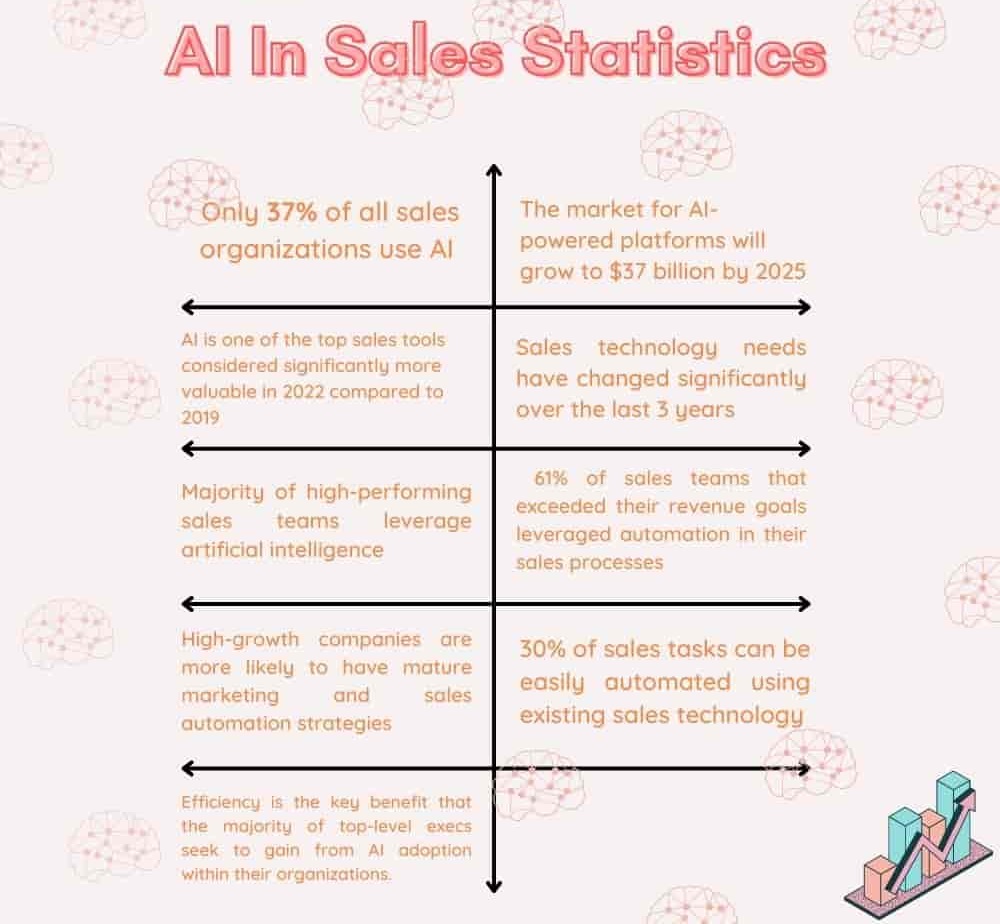
Source: HubSpot
Better Customer Engagement
AI’s part in improving customer commitment is becoming more and more clear as time passes. From analyzing customer behavior to offering personalized experiences, AI’s role has become critical.
Leveraging customer data with AI allows for a deeper understanding of individual preferences and behaviors. It helps predict future actions, leading to proactive measures that enhance the overall customer experience.
Email Marketing and Personalized Interactions
A key area where this plays out is email marketing. Generative AI technology is transforming how businesses communicate with their customers.
AI can automate tasks typically carried out by human sales reps such as lead qualification and product demonstrations. But they go further – they use natural language processing algorithms to create engaging emails tailored to each recipient’s unique interests and needs.
This kind of personal touch doesn’t just save time. It also increases open rates, click-throughs, and conversions – vital metrics in any successful email marketing campaign.
Customer Service
In addition to improving communication efficiency, these advanced tools also provide valuable insights into your customers’ behavior patterns — thanks largely to their ability to analyze large amounts of data quickly and accurately.
This information can then be used to optimize sales processes, making them more effective and efficient whilst simultaneously improving forecasting accuracy.
All things considered, it is clear why so many companies now consider investing significant resources in innovative AI solutions designed specifically for enhancing customer engagement.
So, what are the practical implications of this? Well, AI algorithms analyze data from past interactions to identify patterns. This helps predict future behavior and offers personalized solutions based on the individual’s needs or preferences.
By saving time on manual tasks, sales teams can enhance their effectiveness. This lets them concentrate more on forging customer relationships instead of digging through heaps of data.
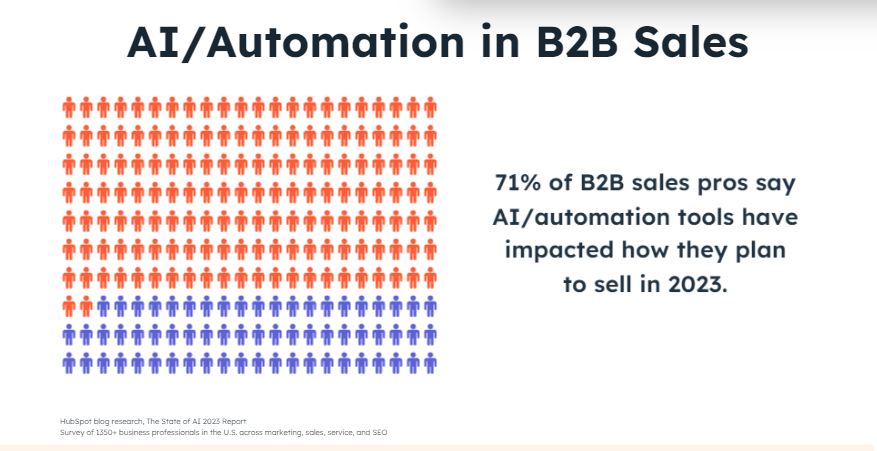
Source: HubSpot
Implementing AI Tools for Sales Excellence
The versatility of AI is remarkable. Depending on a company’s unique needs and goals, there are different AI solutions tailored specifically for diverse sales organizations.
A major shift has been seen with generative AI technology taking center stage. For instance, Microsoft launched Viva Sales, an application designed to help both salespeople and managers optimize their strategies using embedded generative AI algorithms.
To start implementing these tools effectively into your own organization’s strategy, let’s take a look at some specific areas where they can shine:
- Predictive Analytics: Through analyzing data trends and patterns from past performance indicators or market research, predictive analytics can give you valuable insights on potential future outcomes such as lead generation success rate or forecasting accuracy.
- Natural Language Processing (NLP): NLP allows computers to comprehend human language as it’s spoken naturally by us humans — be it written texts or spoken words.
- Data Analysis: Beyond helping make sense of complex datasets quickly, data analysis capabilities allow AIs not only to offer recommendations based on those analyses but even automate tasks usually done by humans.
As we can see, the role of AI in sales management is no longer limited to a supporting one. It has become an active player in driving change within the sales landscape.
Real-World Applications of AI in Sales
AI is like a superhero sidekick for the sales world, making tasks more efficient and unlocking new possibilities. Let’s dive into some specific ways AI can amp up the sales process:
Automated Sales Emails and Letters
AI tools like BrandWell can write personalized and compelling sales emails or letters. Thanks to generative AI, analyzing data on leads and customers to tailor messages is just a click away.
Here’s an example of a sales letter written by BrandWell:
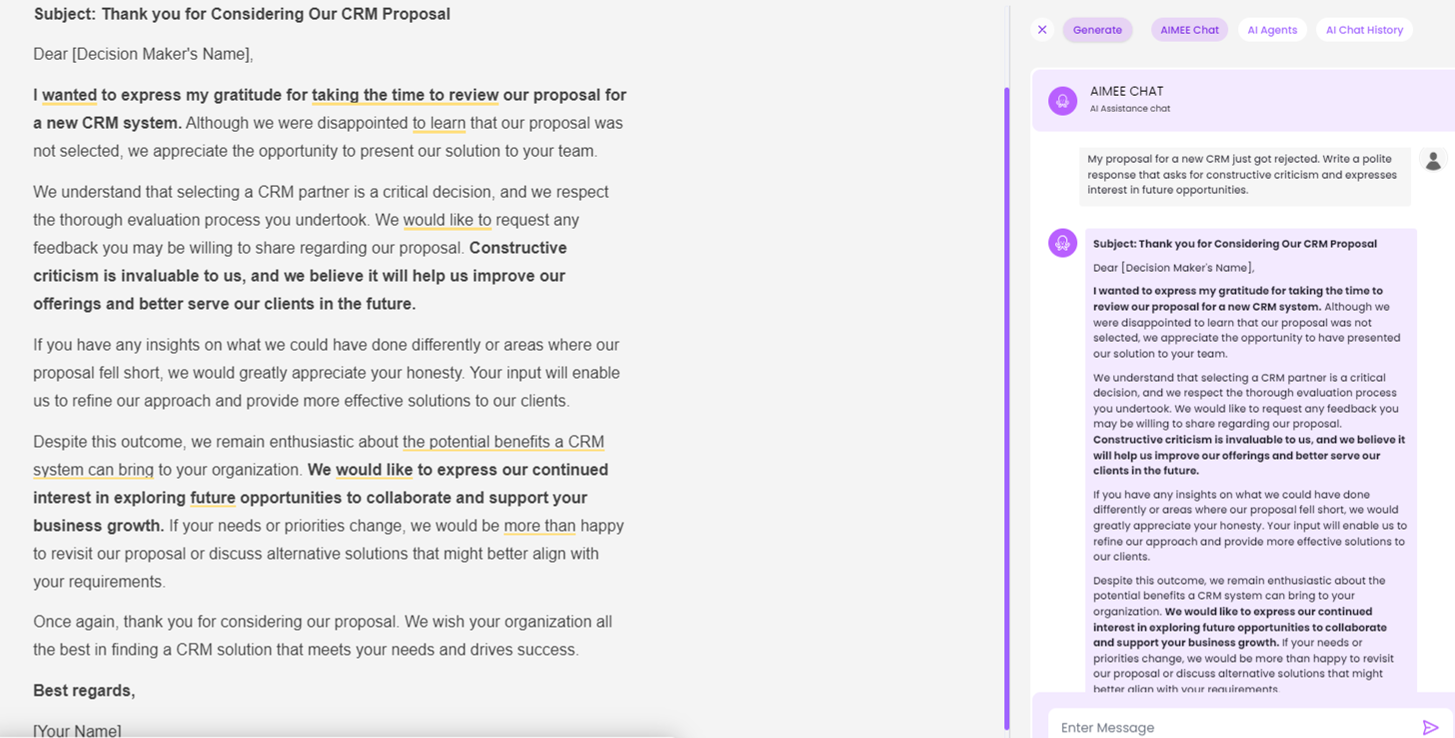
AI can also optimize the timing of email outreach. It knows when your leads are most likely to open and respond, increasing the chances of a positive interaction.
Chatbots for Instant Engagement
AI-powered chatbots are the ultimate round-the-clock sales reps. They can engage with website visitors, answer queries, and even guide potential customers through the early stages of the sales funnel, providing instant responses.
Predictive Analytics for Lead Scoring
AI can sift through vast amounts of data to identify patterns and trends. In sales, this means better lead scoring. It can predict which leads are more likely to convert, helping sales teams prioritize their efforts.
Dynamic Pricing Optimization
AI algorithms can analyze market conditions, competitor pricing, and customer behavior to dynamically adjust pricing. This ensures that your product pricing remains competitive and attractive to potential buyers.
Sales Forecasting
AI can analyze historical sales data, market trends, and various other factors to provide accurate sales forecasts. This helps businesses plan their strategies, allocate resources effectively, and set realistic targets.
Virtual Sales Assistants
AI can handle routine tasks, allowing salespeople to focus on building relationships and strategic thinking. This includes setting appointments, managing schedules, and handling administrative duties.
Personalized Recommendations
AI can analyze customer behavior and preferences to offer personalized product or service recommendations. This enhances the customer experience, increases the likelihood of a sale, and fosters customer loyalty.
Sentiment Analysis
AI can analyze customer interactions, such as emails or social media messages, to gauge sentiment. This helps sales teams understand how customers feel about their products or services, allowing for more targeted and empathetic responses.
In a nutshell, AI isn’t just a tool. It’s a sales ally that can handle the nitty-gritty details, leaving sales professionals with more time to do what they do best – building relationships and closing deals.
Balancing AI and Human Interaction in Sales
As sales representatives and sales managers embrace technology, we need to walk the fine line between sales automation and maintaining the human touch that’s so vital to building relationships.
In an era of AI progress, the necessity of emotional intelligence can’t be undervalued. Yes, machine learning may help us analyze data faster than ever before. But it’s also true that only humans can provide a personal touch which remains critical in establishing long-term relationships with customers.
Consider this: An email marketing campaign automated by generative AI technology might save time spent on drafting each email manually. Yet, without a thoughtful strategy developed by empathetic human beings, how successful would such a campaign really be?
We’re not saying automation doesn’t have its place in ales; far from it. After all, if predictive analytics or natural language processing can optimize sales processes, why wouldn’t we use them?
Finding harmony between artificial intelligence and the irreplaceable qualities offered by real-life humans could mean changes to traditional roles within organizations.
Sales professionals won’t become obsolete because they offer something no algorithm does — a genuine connection with another person. And let’s face it – at heart, we’re social creatures who need interaction. We thrive in it.
AI technology may help in analyzing customer data and automating tasks, but the ability to empathize with a client’s needs? To read between the lines of what they’re asking for? These are things that AI systems aren’t yet capable of fully replicating.
Which Sales Jobs Are at Risk of Being Replaced by AI?
The rise of AI is like a digital tornado reshaping the job landscape, and sales isn’t spared from its whirlwind. Here are some sales jobs that could be facing a bit of a shake-up:
Repetitive Task-Based Roles: Jobs that involve a lot of repetitive tasks, like data entry, follow-up emails, or routine customer inquiries, could be on the chopping block. AI is excellent at handling these monotonous chores with speed and precision.
Lead Qualification: Sorting through leads and deciding who’s hot and who’s not? AI’s got a knack for analyzing data and predicting which leads are more likely to convert. So, roles heavily focused on lead qualification might see some changes.
Basic Customer Service: For straightforward customer queries or common issues, AI-driven chatbots are getting pretty good at providing instant responses. This might impact roles that handle basic customer service tasks.
Predictive Analysis: Jobs centered around analyzing data to predict future trends or customer behaviors could see some shifts. AI algorithms are becoming wizards at forecasting, potentially making some analytical roles more automated.
Transaction-Based Roles: If your job involves a lot of transactional processes, like order processing or invoice generation, AI can streamline these tasks, making them more efficient and reducing the need for as many hands on deck.
Now, the silver lining is that while certain tasks within these roles might get a digital makeover, human touch, empathy, and creativity are irreplaceable. Jobs that require complex problem-solving, relationship-building, and strategic thinking are likely to stay firmly in human hands.
AI-powered tools might streamline certain parts of customer interactions but cannot replace the human element entirely.
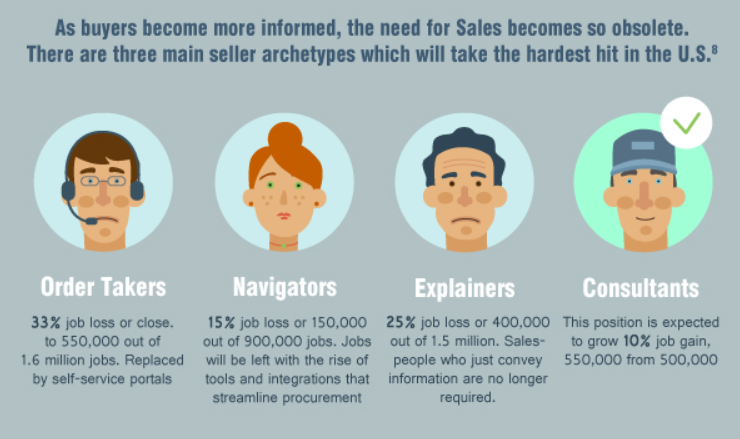
The Future of Sales
If the idea of a robot taking your sales job keeps you up at night, you’re not just imagining things. Brace yourself for the not-so-great news:
According to a McKinsey study, the automation wave might swipe away around 800 million jobs globally by 2030.
Here’s the kicker: McKinsey also discovered that over half of the day-to-day tasks in sales could already be automated with existing technology.
And here’s a heads up from Gerhard Gschwandtner, the brain behind Selling Power magazine – he predicts that within a decade, a whopping 80% of the sales situations currently handled by humans will be taken over by the bots.
It’s not all doom and gloom, though. B2B sales warriors need to wrap their heads around these changes, gear up, and get ready to rock in a future where AI is calling some of the shots.
It’s all about thriving, not just surviving.
FAQs – How AI is Changing Sales
How is AI impacting sales?
AI streamlines the sales process, improves forecasting accuracy, automates tasks, and enhances customer engagement through personalized interactions.
How is AI changing the sales process?
Data-driven decisions are at the forefront of AI. It’s optimizing lead generation, product demos, and follow-ups to make processes more efficient.
Will sales be replaced by AI?
No. While some tasks will become automated due to advancements in technology, human interaction remains essential for building relationships in business.
How is AI changing the market?
The integration of artificial intelligence into various sectors has accelerated decision-making processes while providing a deeper understanding of consumer behavior patterns.
Conclusion
Artificial intelligence is transforming the sales landscape, making it more efficient and effective. From automating tasks to providing data-driven insights, AI has made a significant impact.
We’ve seen how AI is changing sales — offering tools that save time, enhance sales numbers, and make more accurate forecasts.
But don’t forget the human touch. Human feelings remain critical in building long-term relationships with customers.
AI-powered tools are redefining customer engagement too, personalizing interactions like never before. And with different solutions available for diverse needs, every sales organization can find its perfect match.
The future of sales lies within generative artificial intelligence technology — ready to change processes and strategies as we know them.
Ready to automate your sales process? Sign up with BrandWell and let AI write all your sales letters and emails for you!